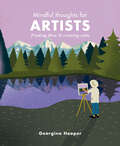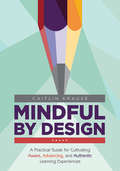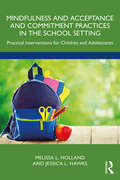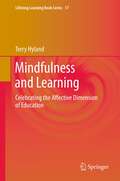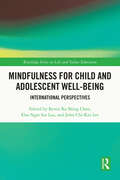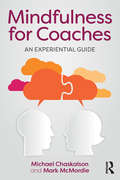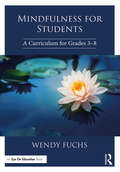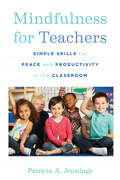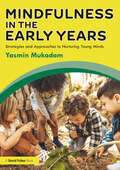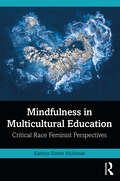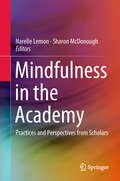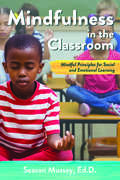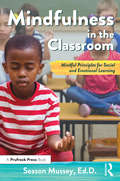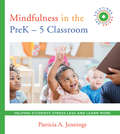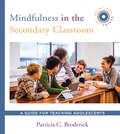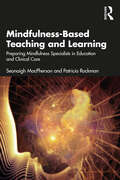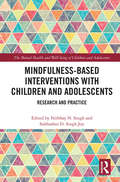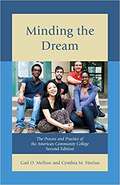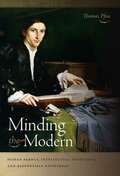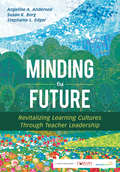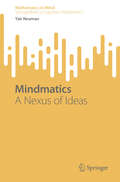- Table View
- List View
Mindful Thoughts for Artists: Finding Flow & Creating Calm (Mindful Thoughts Ser.)
by Georgina HooperFrom connecting with community to discovering your unique way of creating, this book explores the rich rewards of making art mindfully. Art in all its beautiful forms and mediums is a powerful form of expression and meditation. In Mindful Thoughts for Artists, Georgina Hooper illustrates how the act of painting allows us to access the calm that dwells within, and acts as a powerful catalyst for pleasure, acceptance and growth. Awash with colorful splashings of art history, and peppered with the rich teachings of the Ch&’an Buddhists, this lovingly-crafted little book explores how this meditative medium helps us to embrace ourselves in all our different hues. Appealing to all artists, this curated collection of 25 reflections encourages creators to live in the moment, to observe the beauty in everything, and above all, to ensure that the creative process is driven by love and enjoyment. From focussing on the process not the product, to learning to see by slowing down and devoting time to our surroundings, this book will take you on a journey both in your art and in yourself, leading to a happier, creatively free and more mindful self!
Mindful by Design: A Practical Guide for Cultivating Aware, Advancing, and Authentic Learning Experiences (Corwin Teaching Essentials)
by Caitlin E. Krause"Mindful by Design is a guide to well-being, a practical resource, and a creative call-to-action, as Caitlin Krause helps readers to bridge the gap between prioritizing true connection and achieving it." – Leah Weiss, author of How We Work: Live Your Purpose, Reclaim Your Sanity, and Embrace the Daily Grind; Lecturer, Stanford Graduate School of Business "Krause shares valuable strategies that will help any educator, coach, manager, or learning professional bring out the best in those they serve." —Dorie Clark, adjunct professor at Duke University′s Fuqua School of Business and author, Entrepreneurial You and Stand Out "Mindful by Design is a valuable and inspiring guide, offering generous insights and practical advice for those seeking to center, strengthen, and clarify their efforts both in and outside of the classroom." —Dinty Moore, author, The Mindful Writer Take mindfulness beyond the buzzword and spark powerful learning environments! As we navigate complex changes in our professional and personal lives, Mindful by Design is a resource that provides ways to infuse meaningful connection into remote learning, so that learners, teachers, and leaders can flourish. If you′re experiencing "zoom burnout," or just looking for ways to connect more deeply and integrate SEL and mindfulness into the context of your teaching practices, this book is for you! In a busy world full of challenges and distractions, mindfulness is about increasing a sense of presence and intention in everything we do. This must-have resource explores how mindfulness can improve teaching and learning, promoting the development of future-forward skills including creativity, entrepreneurship, innovation, and communication. Readers will learn how to cultivate a personal mindfulness practice that reflects their individuality, and how to create a community of care and respect through mindfulness, inviting learners to seek more authentic interactions with the curriculum, with themselves, and with each other. Mindful by Design provides 24 detailed exercises, including step-by-step mindfulness lessons embedded into specific curriculum areas, ready to implement immediately. Filled with practical, accessible explanations and applications that are adaptive and engaging, this book demystifies mindfulness and empowers each individual to embrace a personal mindfulness practice and inspire powerful learning environments.
Mindful by Design: A Practical Guide for Cultivating Aware, Advancing, and Authentic Learning Experiences (Corwin Teaching Essentials)
by Caitlin E. Krause"Mindful by Design is a guide to well-being, a practical resource, and a creative call-to-action, as Caitlin Krause helps readers to bridge the gap between prioritizing true connection and achieving it." – Leah Weiss, author of How We Work: Live Your Purpose, Reclaim Your Sanity, and Embrace the Daily Grind; Lecturer, Stanford Graduate School of Business "Krause shares valuable strategies that will help any educator, coach, manager, or learning professional bring out the best in those they serve." —Dorie Clark, adjunct professor at Duke University′s Fuqua School of Business and author, Entrepreneurial You and Stand Out "Mindful by Design is a valuable and inspiring guide, offering generous insights and practical advice for those seeking to center, strengthen, and clarify their efforts both in and outside of the classroom." —Dinty Moore, author, The Mindful Writer Take mindfulness beyond the buzzword and spark powerful learning environments! As we navigate complex changes in our professional and personal lives, Mindful by Design is a resource that provides ways to infuse meaningful connection into remote learning, so that learners, teachers, and leaders can flourish. If you′re experiencing "zoom burnout," or just looking for ways to connect more deeply and integrate SEL and mindfulness into the context of your teaching practices, this book is for you! In a busy world full of challenges and distractions, mindfulness is about increasing a sense of presence and intention in everything we do. This must-have resource explores how mindfulness can improve teaching and learning, promoting the development of future-forward skills including creativity, entrepreneurship, innovation, and communication. Readers will learn how to cultivate a personal mindfulness practice that reflects their individuality, and how to create a community of care and respect through mindfulness, inviting learners to seek more authentic interactions with the curriculum, with themselves, and with each other. Mindful by Design provides 24 detailed exercises, including step-by-step mindfulness lessons embedded into specific curriculum areas, ready to implement immediately. Filled with practical, accessible explanations and applications that are adaptive and engaging, this book demystifies mindfulness and empowers each individual to embrace a personal mindfulness practice and inspire powerful learning environments.
Mindfulness and Acceptance and Commitment Practices in the School Setting: Practical Interventions for Children and Adolescents
by Melissa L. Holland Jessica L. HawksThis book offers specific, easy-to-implement mindfulness and acceptance and commitment therapy (ACT) tools for practitioners to use in schools at an individual, group, or classroom-wide level. With the increased focus on the emotional and behavioral health of children in the schools, there is a dearth of practical books that specifically address the use of ACT techniques in the school setting. Geared toward the practitioner and how they work with students, teachers, parents, and classrooms, this book introduces a contemporary approach to targeted intervention and discusses how these services can be provided using an MTSS model. These interventions have numerous benefits including increasing attention capacity, compassion, emotional regulation, and self-calming abilities, in addition to use as an intervention for anxiety, depression, and trauma related symptoms. Graduate students and practitioners who work with children and adolescents such as school psychologists, child and adolescent clinical psychologists, and school counselors will find this book to be a novel resource of interventions for children in grades K–12, along with tools to support parents and teachers.
Mindfulness and Learning: Celebrating the Affective Dimension of Education
by Terry HylandIn recent decades, education at all levels has been seriously impoverished by a growing obsession with standards, targets, skills and competences. According to this model, only a circumscribed range of basic cognitive skills and competences are the business of education, whose main role is to provide employability credentials for people competing for jobs in the global economy. The result is a one-dimensional, economistic and bleakly utilitarian conception of the educational task. In Mindfulness and Learning: Celebrating the Affective Dimension of Education, Terry Hyland advances the thesis that education stands in need of a rejuvenation of its affective function - the impact it has on the emotional, social, moral and personal development of learners. Drawing on the Buddhist conception of mindfulness, he advances a powerful argument for redressing this imbalance by enhancing the affective domain of learning. Mindfulness and Learning: Celebrating the Affective Dimension of Education shows how the concept and practice of 'mindfulness' - non-judgmental, present moment awareness and experience - can enrich learning at all levels. Mindfulness thus contributes to the enhanced achievement of general educational goals, and helps remedy the gross deficiency of the affective/emotional aspects of contemporary theory and practice. The author outlines a mindfulness-based affective education (MBAE) programme and shows how it might be introduced into educational provision from the early years to adult education with a view to harmonising the cognitive-affective balance across the system.
Mindfulness for Child and Adolescent Well-Being: International Perspectives (Routledge Series on Life and Values Education)
by Chan, Kevin Ka Shing Lau, Elsa Ngar Sze Lee, John Chi-KinProviding a comprehensive overview of the benefits of mindfulness for children and adolescents, this edited collection offers an in-depth exploration of research, theory, and practice from international perspectives.The book written by academics and clinicians from the East and the West, first introduces mindfulness and its roots in spirituality and psychology, and then discusses its potential for enhancing the well-being of children and adolescents. It covers a wide range of topics related to the impact of mindfulness on children and adolescents, including its effects on cognitive development, academic performance, school adjustment, emotion regulation, mental health, and social functioning. The chapters also examine how mindfulness-related concepts, such as self-compassion, can benefit children with and without special needs, as well as the importance of mindful family communication and parenting for the well-being of children and adolescents.The volume offers valuable insights to researchers, educators, and practitioners who wish to help young people cultivate mindfulness and enhance well-being. The insights will also be useful for young people and parents who want to learn about the healing power and health benefits of mindfulness.
Mindfulness for Coaches: An experiential guide
by Michael Chaskalson Mark McMordieMindfulness for Coaches accessibly presents theory and research on the benefits of mindfulness training and explores how mindfulness can feature in coaching work. Michael Chaskalson and Mark McMordie explain how coaches can use mindfulness to become more deeply attuned to themselves and to clients, and to create transformational resonance. The authors present a systematic methodology to cultivate and embody a way of being that enables growth and transformation in oneself and in others. The first book of its kind, Mindfulness for Coaches provides an experiential guide, inviting and supporting coaches to engage with the programme included, sharing new qualitative research into the potential impact of mindfulness on coaching process and outcomes, and explicitly linking mindfulness practice to global standards of coaching mastery. Presented in two parts, the book first outlines a unique eight-week programme, Mindfulness for Coaches, and goes on to clarify the links between mindfulness, coaching mastery and different coaching approaches, share insights from the fields of psychotherapy, leadership and organisation development, and provide guidance for further learning. Mindfulness for Coaches will be insightful and inspiring reading for coaches in practice and in training, coaching psychologists and academics and students of all coaching modalities.
Mindfulness for Students: A Curriculum for Grades 3-8
by Wendy FuchsWhat if you walked into your classroom to find a room full of students who were working cooperatively with one another, focusing on the day’s lesson, and able to regulate their own thoughts and feelings? Learn how to teach mindfulness strategies to your elementary and middle school students to provide a foundation for social-emotional well-being and academic engagement. Based on research and designed to complement any school setting, no matter how busy, the practices in this book will create the groundwork for a positive and productive learning environment. The curriculum covers these five key mindfulness practices: Breath awareness Body awareness Focusing on gratitude Kindness toward self and others Open awareness Each chapter includes a detailed lesson plan with suggested wording, as well as support materials (e.g., journal templates, activity sheets, and infographics). These tools, as well as audio recordings of the practices, are also available on our website as free eResources for classroom use (www.routledge.com/9781138586550).
Mindfulness for Teachers: Simple Skills for Peace and Productivity in the Classroom (The Norton Series on the Social Neuroscience of Education)
by Daniel J. Siegel Patricia A. JenningsMindful awareness practices to help teachers recognize and regulate emotional reactivity in their classrooms. Teaching is one of the most rewarding professions, but also one of the most demanding. This book offers simple, ready-to-use, and evidence-proven mindfulness techniques to help educators manage the stresses of the classroom, cultivate an exceptional learning environment, and revitalize both their teaching and their students' knowledge acquisition. Drawing on basic and applied research in the fields of neuroscience, psychology, and education, as well as the author's extensive experience as a mindfulness practitioner, teacher, and scientist, it includes exercises in mindfulness, emotional awareness, movement, listening, and more, all with real-time classroom applications.
Mindfulness in Early Years: Strategies and Approaches to Nurturing Young Minds
by Yasmin MukadamThis book is an accessible companion for all early years practitioners to explore how mindfulness can be integrated into an early years learning environment. It presents topical theory and research, giving practical advice on using mindfulness as an everyday pedagogical tool to improve the emotional wellbeing of children, families and staff members. Providing a step-by-step approach for adopting mindfulness practices, the book offers photocopiable resources, information on mindfulness techniques and opportunities for critical reflection to help create a ‘mindful early years curriculum’. Chapters follows the four pillars of Calm, Acceptance, Relational Approach and Empathy, and include: The benefits of adopting a mindful approach in the early years The importance of staff wellbeing A template mindful curriculum for practitioners to adapt and use Case studies of effective mindful practices Resources, activities and techniques to create your own mindfulness toolkit This delightful book will be a source of inspiration for early years practitioners, early years teachers and those who are interested in introducing and embedding mindfulness into early years practice.
Mindfulness in Multicultural Education: Critical Race Feminist Perspectives
by Kathryn Esther McIntoshGrounded in critical race feminism, this book explores mindfulness as an empowering approach in multicultural education. The author explores how learners of multicultural education—by (re)centering the body through mindfulness with concrete strategies and scaffolded practice—can be empowered to handle the activated emotions and deep self-inquiry that come with the work of social justice, liberation, and anti-racism. This book includes counter stories of students of colors and offers both an epistemological and a curricular approach to mindfulness in multicultural education, including discussion of theory and key principles in addition to ten modules with practices to engage learners. These modules can be directly applied as the basis for curricular changes in teacher education and university-wide social justice courses, or they can be independently read by learners interested in enhancing their wellbeing and social justice. Written for teacher preparation and university social justice courses, this book encourages educators to contextualize their mindfulness practice within a critique of systems of oppression and ask questions about how mindfulness can empower action towards a more just society.
Mindfulness in Multicultural Education: Critical Race Feminist Perspectives
by Kathryn Esther McIntoshGrounded in critical race feminism, this book explores mindfulness as an empowering approach in multicultural education. The author explores how learners of multicultural education—by (re)centering the body through mindfulness with concrete strategies and scaffolded practice—can be empowered to handle the activated emotions and deep self-inquiry that come with the work of social justice, liberation, and anti-racism. This book includes counter stories of students of colors and offers both an epistemological and a curricular approach to mindfulness in multicultural education, including discussion of theory and key principles in addition to ten modules with practices to engage learners. These modules can be directly applied as the basis for curricular changes in teacher education and university-wide social justice courses, or they can be independently read by learners interested in enhancing their wellbeing and social justice. Written for teacher preparation and university social justice courses, this book encourages educators to contextualize their mindfulness practice within a critique of systems of oppression and ask questions about how mindfulness can empower action towards a more just society.
Mindfulness in the Academy: Practices And Perspectives From Scholars
by Narelle Lemon Sharon McDonoughThis book focuses on the way academics understand, embrace and enact the concepts of mindfulness in approaching their work in demanding and dynamic contemporary higher education environments. It examines how they implement formal and informal mindfulness practices that increase the capacity to transform mind and body states by drawing on concepts such as compassion, kindness, gratitude, curiosity, self-awareness and non-judgemental stances. The book provides insights into and highlights the struggles of scholars through their experiences and perspectives in relation to their identities, practices and job enactment. Each chapter author explains their mindfulness practices and their motivations for implementing them, and explores how mindful ways of researching, writing, learning and teaching, leading, and engaging with others leads us to self-awareness and engagement in the present.
Mindfulness in the Classroom: Mindful Principles for Social and Emotional Learning
by Season MusseyMindfulness can be used in the classroom as a method to increase overall teacher effectiveness, raise student achievement, and reignite the joy of teaching and learning. "Mindfulness in the Classroom" introduces eight mindful principles that support social and emotional learning for teachers and students in today's schools, leading to increased empathy, kindness, self-awareness, integrity, self-control, and honesty. The book provides an introduction and theoretical overview of mindfulness, followed by a discussion of the eight mindful principles. Research-based evidence is presented alongside differentiated teaching activities and classroom examples, helping to bridge the gap from theory to practice. Larger implications for schools and society are also discussed, including a call to use these principles to teach the whole child. Mindfulness in the Classroom offers teachers and students a guide for the journey back to the heart of teaching and learning.
Mindfulness in the Classroom: Mindful Principles for Social and Emotional Learning
by Season MusseyMindfulness can be used in the classroom as a method to increase overall teacher effectiveness, raise student achievement, and reignite the joy of teaching and learning. Mindfulness in the Classroom introduces eight mindful principles that support social and emotional learning for teachers and students in today's schools, leading to increased empathy, kindness, self-awareness, integrity, self-control, and honesty. The book provides an introduction and theoretical overview of mindfulness, followed by a discussion of the eight mindful principles. Research-based evidence is presented alongside differentiated teaching activities and classroom examples, helping to bridge the gap from theory to practice. Larger implications for schools and society are also discussed, including a call to use these principles to teach the whole child. Mindfulness in the Classroom offers teachers and students a guide for the journey back to the heart of teaching and learning.
Mindfulness in the PreK-5 Classroom (SEL SOLUTIONS SERIES): Helping Students Stress Less And Learn More
by Patricia A. JenningsTips and tools for promoting calm and focused attention in the classroom. This volume from the editor of the SEL Solutions Series provides a concise introduction to mindfulness for teachers and others who work in preschool and elementary-school settings. Each chapter includes simple, research- tested, practical activities that can be integrated into the school day to help kids calm down and pay attention.
Mindfulness in the Secondary Classroom (SEL Solutions Series): A Guide For Teaching Adolescents (sel Solutions Series)
by Patricia C. BroderickMindfulness includes qualities of mind and heart; it provides a strong foundation for other social and emotional skills. Mindfulness is making inroads into classrooms, as teachers seek ways to center and focus their own attention as well as that of their distracted students. Trish Broderick describes the particular relevance of mindfulness to the teaching of adolescent students, including its potential to alleviate stress, foster motivation, engagement, and compassion—and ultimately, to improve both learning and social relationships. Her book is a guide to applying mindfulness to day-to-day classroom challenges; every chapter contains authentic vignettes of secondary teachers and students, brief practices to try, and a set of takeaway points and reflection questions.
Mindfulness-Based Teaching and Learning: Preparing Mindfulness Specialists in Education and Clinical Care
by Patricia Rockman Seonaigh MacPhersonMindfulness-Based Teaching and Learning is the first comprehensive survey text exploring the history, research, theory, and best practices of secular-scientific mindfulness. With a focus on how mindfulness is taught and learned, this book is an invaluable resource for aspiring or expert mindfulness specialists. Integrating and defining the emerging field of MBTL within a common purpose, evidence-base, and set of transprofessional—and transformational—practices, the book provides both a visionary agenda and highly practical techniques and tools. Chapters provide curriculum design and teaching tips, explore the expert-validated MBTL-TCF competency framework, and reveal insights into the ways self-awareness can evolve into ecological awareness through intensive retreats.
Mindfulness-based Interventions with Children and Adolescents: Research and Practice (The Mental Health and Well-being of Children and Adolescents)
by Nirbhay N. Singh Subhashni D. Singh JoyThis book comprehensively reviews mindfulness-based interventions for specific areas of functioning in children and adolescents, with refreshing insights and perspectives. Based on a solid foundation of research and practice, it presents the nature of mindfulness, examines the psychological processes that may underlie mindfulness, and explores how to assess it. Mindfulness is about how we can be attentive to and present for everything that happens in our daily lives. This book draws upon current research in the field in order to explore topics such as the fundamentals of teaching mindfulness to children and adolescents; assessment of mindfulness in this population; use of mindfulness in educational settings; and clinical applications in mental health, including substance abuse, hyperactivity, and intellectual and developmental disabilities. With contributions from internationally-renowned clinicians and scholars, this book provides a balanced account of the strengths and weaknesses of current research, and how mindfulness-based programs can be used to enhance wellbeing and reduce suffering. This book will be of great interest for academics, scholars and post graduate students involved in the study of the mental health of children and adolescents. It will also appeal to psychologists, psychiatrist, nurses, social workers, rehabilitation therapists and others, such as school counsellors, who provide clinical care to children and adolescents.
Minding The Dream: The Process And Practice Of The American Community College
by Gail O. Mellow Cynthia M. HeelanMinding the Dream provides challenging, reflective, and practitioner-based information about community colleges that is data-based, clear and accessible for the general reader as well as the scholar. New employees, current leaders, graduate students, legislators, and boards of trustees need a grounded sense of the magnitude of the community college sector. Minding the Dream evokes the laudatory goals of the early pioneers of the community college movement, while accurately framing key programs and political conundrums challenging community colleges. Minding the Dream celebrates community colleges’ successes and is scrupulously honest about their failings. Community college leaders need honest information about what’s working and need to be challenged about the things that are not. State Legislatures and Congress need updated facts to assist them in making wise funding decisions regarding community colleges. Community college advocates need updated information to assist them in their advocacy work, and Higher Education programs need an updated book about community colleges to use as a basic text. These are the people who can benefit from reading Minding the Dream.
Minding The Modern: Human Agency, Intellectual Traditions, And Responsible Knowledge
by Thomas PfauIn this brilliant study, Thomas Pfau argues that the loss of foundational concepts in classical and medieval Aristotelian philosophy caused a fateful separation between reason and will in European thought. Pfau traces the evolution and eventual deterioration of key concepts of human agency―will, person, judgment, action―from antiquity through Scholasticism and on to eighteenth-century moral theory and its critical revision in the works of Samuel Taylor Coleridge. Featuring extended critical discussions of Aristotle, Gnosticism, Augustine, Aquinas, Ockham, Hobbes, Shaftesbury, Mandeville, Hutcheson, Hume, Adam Smith, and Coleridge, this study contends that the humanistic concepts these writers seek to elucidate acquire meaning and significance only inasmuch as we are prepared positively to engage (rather than historicize) their previous usages. Beginning with the rise of theological (and, eventually, secular) voluntarism, modern thought appears increasingly reluctant and, in time, unable to engage the deep history of its own underlying conceptions, thus leaving our understanding of the nature and function of humanistic inquiry increasingly frayed and incoherent. One consequence of this shift is to leave the moral self-expression of intellectual elites and ordinary citizens alike stunted, which in turn has fueled the widespread notion that moral and ethical concerns are but a special branch of inquiry largely determined by opinion rather than dialogical reasoning, judgment, and practice. A clear sign of this regression is the present crisis in the study of the humanities, whose role is overwhelmingly conceived (and negatively appraised) in terms of scientific theories, methods, and objectives. The ultimate casualty of this reductionism has been the very idea of personhood and the disappearance of an adequate ethical language. Minding the Modern is not merely a chapter in the history of ideas; it is a thorough phenomenological and metaphysical study of the roots of today's predicaments.
Minding the Future: Revitalizing Learning Cultures Through Teacher Leadership
by Angeline A. Anderson Susan K. Borg Stephanie L. EdgarHarness the power of teacher collaboration and engagement to see real results for students! Welcome to Transform Academy, where committed teachers become teacher leaders, empowered to revitalize learning cultures while keeping the future in mind. This boundary-breaking professional-learning process—centered on teacher voice and grounded in foundations of collaboration and data-informed planning—challenges schools to move beyond accountability standards and toward innovative learning that ignites student engagement. As you follow the story of Transform Academy, you’ll find accompanying action steps to help you implement the process, along with strategies to inspire personalized instruction and redesign learning environments. Other supports include: Detailed and inspiring vignettes Relevant research connections Questions for discussion Activities and prompts for individuals and teams Links to professional-learning standards Follow Transform Academy’s journey of discovery, and see the results for yourself. Minding the Future outlines a very clear framework for how a school might reimagine professional learning in support of results for students. What’s especially helpful are the tools and resources that will help educators through every step of the process. Thank you for bringing this great resource to the field! Frederick Brown, Deputy Executive Director, Learning Forward If you’ve been searching for proven strategies on creating a vision, planning, and establishing a learning culture ready for transformation, this is it. Written with knowledge only gained from experience, Minding the Future presents readers with clear plans, brought to life with anecdotes and stories, to lead their own professional learning transformations. This book is for educators wishing to embrace the future head-on and hand in hand! Linda Macias, Associate Superintendent, Cypress-Fairbanks ISD, Houston, TX
Minding the Future: Revitalizing Learning Cultures Through Teacher Leadership
by Angeline A. Anderson Susan K. Borg Stephanie L. EdgarHarness the power of teacher collaboration and engagement to see real results for students! Welcome to Transform Academy, where committed teachers become teacher leaders, empowered to revitalize learning cultures while keeping the future in mind. This boundary-breaking professional-learning process—centered on teacher voice and grounded in foundations of collaboration and data-informed planning—challenges schools to move beyond accountability standards and toward innovative learning that ignites student engagement. As you follow the story of Transform Academy, you’ll find accompanying action steps to help you implement the process, along with strategies to inspire personalized instruction and redesign learning environments. Other supports include: Detailed and inspiring vignettes Relevant research connections Questions for discussion Activities and prompts for individuals and teams Links to professional-learning standards Follow Transform Academy’s journey of discovery, and see the results for yourself. Minding the Future outlines a very clear framework for how a school might reimagine professional learning in support of results for students. What’s especially helpful are the tools and resources that will help educators through every step of the process. Thank you for bringing this great resource to the field! Frederick Brown, Deputy Executive Director, Learning Forward If you’ve been searching for proven strategies on creating a vision, planning, and establishing a learning culture ready for transformation, this is it. Written with knowledge only gained from experience, Minding the Future presents readers with clear plans, brought to life with anecdotes and stories, to lead their own professional learning transformations. This book is for educators wishing to embrace the future head-on and hand in hand! Linda Macias, Associate Superintendent, Cypress-Fairbanks ISD, Houston, TX
Mindmatics: A Nexus of Ideas (Mathematics in Mind)
by Yair NeumanMindmatics invites readers into a captivating exploration where the boundaries between mind and mathematics dissolve. Professor Neuman delves into the profound connections between cognitive processes and mathematical expression in this groundbreaking work. From how children grasp abstract concepts to symmetry's role in art and mathematics, this book uncovers the hidden structures that shape our understanding of the world. With insightful discussions on the relationship between poetry and mathematics and the essential role of the unconscious in fostering mathematical imagination, Mindmatics offers a unique perspective on the interplay of thought, creativity, and logic. This book is a must-read for anyone curious about the deeper links between the human mind and the mathematical universe.
Minds Online: Teaching Effectively with Technology
by Michelle D. MillerFor the Internet generation, educational technology designed with the brain in mind offers a natural pathway to the pleasures and rewards of deep learning. Drawing on neuroscience and cognitive psychology, Michelle Miller shows how attention, memory, critical thinking, and analytical reasoning can be enhanced through technology-aided approaches.
